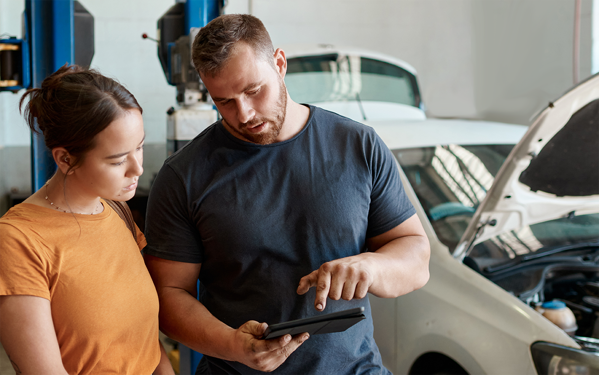The European Commission’s so-called Industrial Action Plan for the European automotive sector highlights digitalization, innovation, and sustainability as the path to a competitive automotive industry in Europe. But as it stands, several key conditions are still missing.
For the industrial plan to work in practice, the following are required:
- Free access to vehicle data
Faster and more effective measures are needed to ensure that independent operators and service providers have access to vehicle data. The current Data Act does not meet the needs of all stakeholders in the automotive industry.
- Technical information for repairs and updates
Regulations around access to technical information—such as battery data, which is crucial for assessing battery condition and safety—must be clearer and easier to follow.
- Rules for reuse and remanufacturing
The EU should increase support for the reuse and repair of vehicle parts. This reduces waste and promotes more sustainable use of resources.
- Technology neutrality
All sustainable solutions—like electric, hydrogen, and renewable fuels—should be given equal opportunity and support to help meet Europe’s climate goals. As vehicle and component testing rules are streamlined, it’s essential that emerging technologies are evaluated fairly and responsibly.
- Skills development
Everyone in the automotive sector—from manufacturers and suppliers to retailers, repair shops, and recycling operators—needs opportunities to build the skills required to meet future challenges.
Without these elements, independent players won’t have the right conditions to compete and provide smart, sustainable services. This threatens both innovation in the industry and car owners’ freedom of choice.
Therefore, an open automotive aftermarket is essential
MEKO, along with the European industry association FIGIEFA, sees a clear need for stronger regulations to secure the future of the automotive sector and ensure that vehicle owners retain the freedom to choose where their vehicles are serviced and repaired.

“As a member of the industry association, we support FIGIEFA and see a clear need to ensure fair competition, free access to vehicle data and repair information. A technology-neutral transition to sustainable transport is also needed. With these conditions in place, independent businesses can continue developing in-demand digital services and sustainable solutions — benefiting both the environment and car owners,” says Petra Bendelin, Chief Operating Officer at MEKO.
Facts about the European Commission’s Industrial Plan for the Automotive Sector
The automotive industry is vital to Europe’s economy, providing 13 million jobs. Europe is a global leader in trucks and other vehicles. The industry is currently undergoing rapid change, driven by the rise of electric vehicles and digital technologies. At the same time, it faces challenges such as dependence on critical raw materials, rising costs, talent shortages, and global uncertainty.
The European Commission’s plan aims to help Europe maintain its strong position by focusing on five key areas: new technology and digitalization, environmentally friendly vehicles, resilient and secure supply chains, education and skills development, and fair rules and conditions for businesses.
|
How car owners and workshops are affected in practice
Clear and balanced regulations, combined with transparent access to information, empower independent players to compete effectively—resulting in greater choice and lower costs for car owners. Below are specific examples that illustrate why fair conditions are necessary, and why adjustments to the current EU plan are critical to ensure a truly competitive and consumer-friendly market:
-
Access to data from connected cars
-
-
For workshops:
Repair and service providers need access to real-time vehicle data—such as sensor and status information—to deliver reliable, safe, and efficient services. This data also enables the development of new digital solutions and fair competition with car manufacturers.
-
-
For car owners:
Access to connected data means faster, better, and often more affordable service from a wider range of workshops, as well as access to smart services that make car ownership simpler and safer.
- Remanufacturing and refurbishing of parts
- Access to repair information
-
-
For workshops:
Independent and authorized workshops alike must have equal access to the technical and legal information needed for repairs and updates—including software updates, diagnostics, and repair manuals. This ensures they can offer safe and accurate services on equal terms.
- Technology-neutral approach to cleaner transport
-
-
For workshops:
Supporting all sustainable technologies—including electric, hydrogen, and renewable fuels—gives businesses more flexibility to offer a variety of services. It prepares them to meet future demands and market shifts.

EU’s plan for the automotive sector under review – focus on innovation and fair conditions
The EU Commission’s 2025 industrial plan for the automotive sector aims to strengthen Europe’s position in green, digital, and competitive mobility. Measures such as flexible emissions targets, investments in battery technology, and support for autonomous vehicles are intended to pave the way for a future-proof ecosystem—but several aspects still require new legislation, according to FIGIEFA, which reviewed the plan from the perspective of the independent automotive aftermarket.
The industry association FIGIEFA warns that some green transition measures risk distorting competition, especially for small and medium-sized companies. In an article in The Parliament, FIGIEFA highlights several areas where EU actions need adjustment to ensure open markets and technology neutrality:
-
The Commission states that data from connected cars is important, but the plan does not sufficiently help companies working on repair and maintenance after sales. The recommendations are voluntary rather than mandatory, making it difficult for these companies to gain early access to critical data. This access is necessary to develop new smart services.
- The plan focuses mostly on recycling old cars but overlooks that repairing and reusing parts is also important. Repairing and reusing parts benefits the environment and reduces costs while extending vehicle lifespan.
- Simplifying regulations only for approving new cars is not enough. As vehicles increasingly rely on software and are connected to the internet, rules must enable technical updates, secure access to repair information, and the ability to activate components. This allows independent workshops to continue operating and customers to choose where to have their cars repaired.
- Europe’s push for cleaner transport must be open to all types of technologies. It is important to support hydrogen, renewable fuels, and other solutions alongside battery electric vehicles. Europe’s climate goals should not be limited to a single technology; multiple sustainable solutions must have equal opportunity to contribute to the transition.
Without an independent aftermarket, Europe risks losing both innovation capacity and consumer benefits. To meet climate targets, strengthen industry, and give car owners fair choices, a plan that includes the entire ecosystem is essential.
Learn more at figiefa.eu







